On and Off the Hill
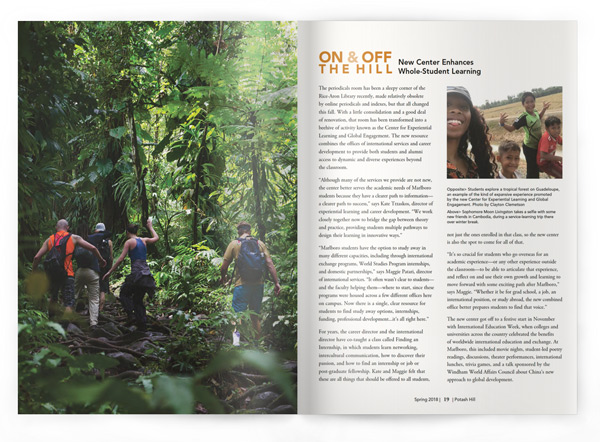
New Center Enhances Student Learning
The periodicals room has been a sleepy corner of the Rice-Aron Library recently, made relatively obsolete by online periodicals and indexes, but that all changed this fall. With a little consolidation and a good deal of renovation, that room has been transformed into a beehive of activity known as the Center for Experiential Learning and Global Engagement. The new resource combines the offices of international services and career development to provide both students and alumni access to dynamic and diverse experiences beyond the classroom.
“Although many of the services we provide are not new, the center better serves the academic needs of Marlboro students because they have a clearer path to information— a clearer path to success,” says Kate Trzaskos, director of experiential learning and career development. “We work closely together now to bridge the gap between theory and practice, providing students multiple pathways to design their learning in innovative ways.”
“Marlboro students have the option to study away in many different capacities, including through international exchange programs, World Studies Program internships, and domestic partnerships,” says Maggie Patari, director of international services. “It often wasn’t clear to students—and the faculty helping them—where to start, since these programs were housed across a few different offices here on campus. Now there is a single, clear resource for students to find study away options, internships, funding, professional development...it’s all right here.”
For years, the career director and the international director have co-taught a class called Finding an Internship, in which students learn networking, intercultural communication, how to discover their passion, and how to find an internship or job or post-graduate fellowship. Kate and Maggie felt that these are all things that should be offered to all students, not just the ones enrolled in that class, so the new center is also the spot to come for all of that.
“It’s so crucial for students who go overseas for an academic experience—or any other experience outside the classroom—to be able to articulate that experience, and reflect on and use their own growth and learning to move forward with some exciting path after Marlboro,” says Maggie. “Whether it be for grad school, a job, an international position, or study abroad, the new combined office better prepares students to find that voice.”
The new center got off to a festive start in November with International Education Week, when colleges and universities across the country celebrated the benefits of worldwide international education and exchange. At Marlboro, this included movie nights, student-led poetry readings, discussions, theater performances, international lunches, trivia games, and a talk sponsored by the Windham World Affairs Council about China’s new approach to global development.
A highlight of the week was a performance by special guest and Afro-Caribbean artist Andrew Clarke, hosted by Living In Color in the new Center for Equity, Empowerment and Inclusion—formerly known as Marlboro Gardens. Andrew performed from the play The Black That I Am, a monologue that explores the journey of a Jamaican man moving to the U.S. and trying to fit into the cultural fabric of America.
“The Center for Experiential Learning and Global Engagement offers a broad range of services to help Marlboro students channel their passions into valuable off-campus experiences and meaningful work, starting with their first year and continuing after graduation,” says Kate. “From assessing interests to developing skills, we want to empower students and alumni to explore, define, and realize their post-graduate goals.”
Amy Beecher Brings Intellectual Freedom to Art
By Emmett Wood
“Marlboro’s belief that art is a process informed by craft, play, reflection, and contextual awareness echoes my own artistic and pedagogical views,” says Amy Beecher, who joined Marlboro as visual arts professor in the fall. “The college itself is attractive, but the idea that my intellectual freedom as an educator is honored as much as my artistic freedom is what drew me here.”
Amy’s academic history includes a BA from Brown University and an MFA from Yale, where she began using inkjet prints as a way to express herself. Amy cites pop culture as one of her biggest sources of inspiration.
“I’m trained as a painter—that’s what I studied in college and graduate school,” says Amy. “But while I was there I started making inkjet prints. When I began pushing that further, it led to making enormous inkjet prints. They were so big that they started to become installation-like… eventually I started to combine them with other types of work in poetry and sound.”
Although Amy’s career objective has always been to create art and teach, after college she began trying various vocations in order to continue her work, including being an adjunct professor, a personal assistant, and a photo researcher for Teen Vogue. Then she discovered the art community AS220, located in Providence, Rhode Island, where she spent the last two years before coming to Marlboro. AS220 maintains artist residencies, exhibition spaces, and other collective resources.
Amy says that her transition to Marlboro proved to be rather smooth following her time at AS220, as the organization’s values “echoed the Marlboro ethos.” Her choice to make the move to Vermont was rooted in her desire to continue changing; “I felt like the type of teaching that I could do at Marlboro could shift and change with me as I evolved as an artist. I couldn’t find that anywhere else.”
One of Amy’s recent pop culture inspirations has been Cathy, the comic strip by Cathy Guisewite that ran from the 1970s to 2010, which gently poked fun at modern-day women through the protagonist’s struggles with work, weight gain, and interpersonal relationships. As a recent fellow in interdisciplinary art at the MacDowell Colony, Amy worked on a project that offers critical revisions of the Cathy comic series in drawing, text, and sound.
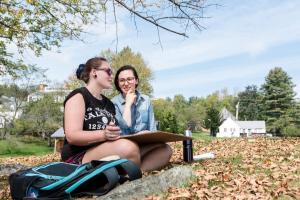 “What I learned was that the Cathy I grew up with in the late ’80s and early ’90s had over the course of the last 20 years morphed from a conflicted feminist into a passive, apolitical subject, and I became interested in reinventing her and making up a new end to her story. I like to re-imagine Cathy as a more complex character than the one I think she evolved to be.”
“What I learned was that the Cathy I grew up with in the late ’80s and early ’90s had over the course of the last 20 years morphed from a conflicted feminist into a passive, apolitical subject, and I became interested in reinventing her and making up a new end to her story. I like to re-imagine Cathy as a more complex character than the one I think she evolved to be.”
As her art continues to grow and change, Amy looks forward to furthering her education with Marlboro students. In the fall she taught two courses, one centered around the concepts of color and one on drawing. This spring she is teaching a course called Accessorizing Painting and another on Alternative and Artist-run Spaces. She is excited to see more work from the students, whom she describes as “a true community of interdisciplinary intellectuals and artists.”
“A lot of students take art classes thinking about how art is going to fit into this much broader project of their Plan. And so when they come to your class it’s not just to make art, it’s to see if artistic methods will be useful to them as part of a broader inquiry. To me, that is quite advanced—to be thinking not only ‘what am I learning,’ but ‘what’s the big picture here and how can I transfer this knowledge of making elsewhere?’”
Bronwen Tate Finds Permeability in Writing
By Emmett Wood
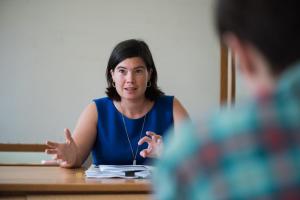 “This is a place where I don’t have to choose between the different interests that I have,” says Bronwen Tate, who joined Marlboro as writing professor in the fall. “Instead of feeling like I’m being pulled in too many directions or like I’m spreading myself too thin, I feel like I can do all this work and enjoy it.”
“This is a place where I don’t have to choose between the different interests that I have,” says Bronwen Tate, who joined Marlboro as writing professor in the fall. “Instead of feeling like I’m being pulled in too many directions or like I’m spreading myself too thin, I feel like I can do all this work and enjoy it.”
In keeping with the traditional flexibility and individuality that goes into classes at Marlboro, Bronwen plans on helping students hone their writing skills in the broadest of ways. In the fall she was already teaching several tutorials with seniors in their final semester, as well as a writing seminar on food and culture and a workshop course on narratology and narrative craft.
“I’ve been working with first-year students for the past three years,” says Bronwen, who came to Marlboro after teaching in Stanford’s interdisciplinary critical-thinking program, Thinking Matters. “So to work with students who are at different points along the way and to see the progress of students who have been with a project for a while is really great. I have students who haven’t done much creative writing at all, and others who are on Plan and have full novels under their belts. So I’m trying to bring everyone into the conversation, make it useful, not get anyone freaked out or make others bored.”
Bronwen received an AB in comparative literature from Brown University, then spent time in Italy teaching English as a second language before returning to Brown to complete an MFA in literary arts. After a year teaching community college in New York City, she went on to earn her PhD in comparative literature from Stanford University, with a dissertation titled “Large as Life: The Scale of Post-1945 American Poetry.”
While her workshop course last fall focused on narrative prose, Bronwen is a published poet. Various selections from her current poetry manuscript, Probable Garden, a recent finalist or semifinalist for several book awards, have appeared in journals including Denver Quarterly, Lit, and the Laurel Review, as well as in chapbooks Vesper Vigil and Like the Native Tongue the Vanquished. At Marlboro, Bronwen takes an interest in many forms of writing and enjoys bringing them together in diverse ways.
“I’m here to teach writing in a lot of different ways, and I’m excited to be in a place where there is this kind of permeability of writing, where creative writing isn’t over here and scholarly writing over there. I like to think across genres. I’m really interested in empowering students to write what they have a hard time putting language to, what feels urgent and real for them.”
Bronwen’s future plans for classes include a poetry workshop as well as a multi-genre workshop with a focus on environmental crises. “In my upcoming classes I plan to include realistic fiction, fairy tale/fantasy fiction, personal essay, and poetry. I really just want to encourage students to try out a bunch of different genres and think about them. I’d like them to think about the audiences writers are attempting to reach, what different genres can achieve and what they can’t, and then pick a genre that they feel excited about exploring in a longer project.”
Bronwen is enjoying the opportunities to learn and grow that come along with beginning at a new school, such as introducing a pop-up class on Cultivating a Daily Practice in response to student interest in National Novel Writing Month (see page 24). “My mantra is that in ‘beginner’s mind’ there are many possibilities and to the expert there are few. I am trying to embrace everything with a spirit of, ‘how can I contribute to things?’”
Graduate Teaching Programs Partner with the Peace Corps
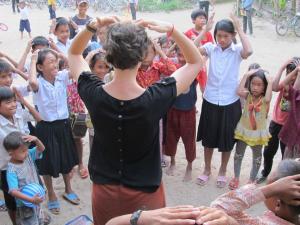 In December, Marlboro College was pleased to announce that all of its graduate teaching programs have been approved to partner with the Peace Corps as part of the Paul D. Coverdell Fellows Program. The Coverdell program will offer significant financial assistance for returning Peace Corps Volunteers choosing to attend graduate teaching programs at Marlboro.
In December, Marlboro College was pleased to announce that all of its graduate teaching programs have been approved to partner with the Peace Corps as part of the Paul D. Coverdell Fellows Program. The Coverdell program will offer significant financial assistance for returning Peace Corps Volunteers choosing to attend graduate teaching programs at Marlboro.
“As someone with a keen appreciation of the value of both Peace Corps service and a Marlboro education, I am especially pleased with this new partnership,” said President Kevin, speaking from his own experience as a Peace Corps Volunteer, country director in Thailand, and president and CEO of the National Peace Corps Association (NPCA). “This new partnership is a perfect way for Peace Corps Volunteers to build on their skills and experience a Marlboro education that will prepare them well to shape a purpose-driven life.”
The Coverdell Fellows Program offers returned Peace Corps Volunteers the opportunity to earn a Master of Arts in Teaching (MAT) through one of the three graduate teaching programs at Marlboro College: Teaching with Technology, Teaching for Social Justice, and TESOL. The program offers financial support to fellows, and allows returned volunteers to gain valuable professional experience through internships in underserved communities in the United States.
Pop-up Class Fosters Daily Practice
One of the key outcomes of last summer’s “action planning group” discussions on curriculum was the suggestion to offer pop-up classes on emerging issues or events that students want to learn more about. Marlboro’s new writing professor, Bronwen Tate, rose to the challenge in November, responding to students interested in participating in National Novel Writing Month, known as NaNoWriMo.
“I was excited about the idea of supporting students taking on NaNoWriMo, but thought that it might be useful to open the course up to practices other than writing and to goals other than completing a full-length novel,” says Bronwen. She called the course Cultivating a Daily Practice, and invited participants to come up with clearly measurable daily goals for progress on any long-term project, from artwork to podcasts to math research. “Over the course of my own writing, I’ve become a big believer in the transformative power of gradual steady progress, and I wanted to share this with students.”
The class met weekly on Tuesday evenings, in the dining hall, with additional informal meetings hosted by several of the students throughout the week, all around campus. Bronwen developed a series of discussion and reflection questions for each week that asked students to focus on their practice in different ways, including the behavioral, artisanal, social, and emotional habits that sustain them.
“A big goal of the course was just getting students to step back a bit from the work they’re doing and think about how they do it: what works, what doesn’t, and really, where they can find greater joy in it,” says Bronwen. “How they can stick with it through moments of frustration and not get derailed.”
“This month was wonderful,” says freshman Xander Porter, who wrote five pages in her journal each day. “I learned so much about myself as a writer, a student, and a person. I will take what I learned in regard to my habits and use it for the next time I sit down to write a paper.”
“This class gave me a justification for spending time on something I ultimately found very rewarding and meditative,” says freshman Cedar Van Tassel, who brought woodworking tools to breakfast each day and carved woodblock prints. “Whatever I was working on was usually well received too, and this outside positive reinforcement seemed to be an uncommon part of many other people’s routines.”
The format encouraged students to set their own goals, and Bronwen found that many students felt more ownership and agency in their education as a whole. Students were consistently supportive and respectful of one another’s struggles, and the class had some valuable support and participation from other members of the community. President Kevin committed to a daily practice of reading poetry, “with a goal of reawakening the muse,” and math professor Matt Ollis sent weekly email updates with detailed charts of his math research progress.
“The invitation to observe and reflect on their own process has led to lots of little light-bulb moments,” says Bronwen. “At Marlboro, we’re small enough and nimble enough in our organizational structure that things can go from idea to course in just a few days. Pop-ups like this really let us take advantage of that.”
Illustrious Faculty Members Retire
“Working at Marlboro College has been a wonderful experience—one in which the learning environment is a shared adventure,” says Cathy Osman, visual arts professor. Like all great adventures, this one is sadly coming to an end for Cathy and three other esteemed and beloved colleagues—Tim Segar, Jay Craven, and Lynette Rummel—who will retire next year.
Cathy came to Marlboro in 1997, and has been instrumental in the evolution, expansion, and sustained strength of the visual arts within the Marlboro curriculum. She enjoyed the close collaboration between herself and students as well as the unique ability to know her students both personally and professionally.
“Cathy is the real deal as an artist and teacher,” says Mara Eagle ’12, an artist based in Montreal and pursuing an MFA at Concordia University. “She is rigorous, playful, serious, adventuresome, patient, and deeply caring. Her commitment to making, looking, and questioning in her own artistic practice is equaled by her commitment to her students. “
“I can honestly say my relationship with my students has been a partnership, built on mutual respect, curiosity, and trust,” says Cathy. “What could be more rewarding than this?”
“As an artist and a teacher, I still draw upon my time with Cathy in terms of how I approach critique and discourse around art,” says Rafael Kelman ’09, who received his MFA from Hunter College and is currently an artist working in New York City. “Whatever the nature of a given critique, she always made it clear that she respected me as an artist and she respected the work I was showing her...as long as I respected it myself.”
“Through each step of inquiry, action, and commitment, she taught me to make, take it apart, do and undo; she wanted me to be fluent in my own visual language and to find my own voice,” says Marta Willgoose ’01, a Marlboro trustee, artist, and consultant for non-profits. “I’ve used this practice in countless aspects of my work and life as an artist, a professional, a mother, and a citizen of humanity.”
Cathy especially enjoyed the sense of shared discovery on several international trips, beginning with a faculty-led trip to Cuba, two trips to Vietnam, and two trips to Mexico. Her deepest connection has been in Cambodia, where the art faculty has sustained a deep relationship and she has participated in four faculty-led trips over the years.
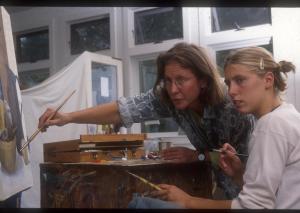 Despite the rigors of teaching, committee work, and other responsibilities of being a faculty member, Cathy was also able to actively maintain her own practice as an artist, and exhibited frequently in the region. In 2014 she was awarded a Vermont Arts Council “creation grant” to support a body of work addressing her experiences in Cambodia and the multifaceted relationship between the U.S. and the Southeast Asian nation.
Despite the rigors of teaching, committee work, and other responsibilities of being a faculty member, Cathy was also able to actively maintain her own practice as an artist, and exhibited frequently in the region. In 2014 she was awarded a Vermont Arts Council “creation grant” to support a body of work addressing her experiences in Cambodia and the multifaceted relationship between the U.S. and the Southeast Asian nation.
“Cathy has maintained a sense of being curious and open to the world even though she knows so much about art—that knowledge hasn’t stopped her from exploring new ideas,” says Nina Eslambolipour ’15, who did a body of artwork inspired by the immigrant identity for her Plan. “My favorite part of working with her was knowing the extent of how much care and respect she has for her students and community. Her style really allowed me to grow and sparkle.”
“Her contributions as a community member are thorough and discerning,” says Zoe Holland ’14, who did her Plan of Concentration on drawing, sculpture, and animation. “She doesn’t stop thinking. As her student, I always knew Cathy was being honest with me, with her critique and her friendship. She’s a treasure.”
Tim Segar, another treasure and Cathy’s husband, had been teaching for 14 years before coming to Marlboro in 1998, but was surprised at how different the experience of teaching here was. He found he had to re-invent himself as a teacher.
“Here it was not enough to teach to a given group of students—rather I found that I had to learn to engage each one,” says Tim, visual arts and environmental studies professor. “The scale and culture of Marlboro allow this to happen. Until coming here, I was unaware of how much of a difference that made, not just in the success of the students but in how much more I enjoyed the work.”
“It was a lucky coincidence that I was able to work with Tim, as he began teaching at Marlboro during my last semester,” says Chris Oliver ’99, who now helps run the studios at Cornell’s College of Architecture, Art, and Planning. “At the time I was one of the few students, if not the only one, focusing specifically on sculpture, and it was great to have Tim’s sculpture-specific—and Tim-specific—insights to cap off my work at Marlboro.”
Tim found it rewarding to help incorporate the arts into Marlboro’s liberal arts curriculum, something transformative for both himself and students. He enjoyed collaborating with colleagues—from working with other environmental studies faculty on an introductory course, to a summer arts semester in London with Stan Charkey (music) and Paul Nelson (theater). He was also pleased to introduce architecture to the curriculum.
“Whether I was just starting a new idea or in the finishing stages of a sculpture, Tim always made me think about it a little deeper and a little smarter,” says Erik Dennis ’14, who did his Plan in biology and sculpture and is now working as a blacksmith. “In tutorials, I would bring up some vague idea for a project and Tim would show me five different artists or pieces that related to what I was talking about. I could never predict what path we would venture down, but it always led somewhere interesting.”
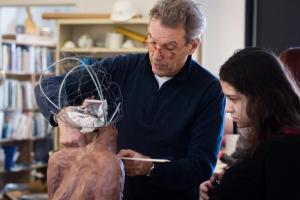 “At too many other colleges, the cultivation of individual achievement, particularly in the visual arts, is attained passively by setting a problem and leaving students to find their own way towards solutions,” Tim says. “At Marlboro, open inquiry, shared critique, search for subjects and solutions that matter, early introduction to history and theory, and emphasis on individual exhibition all add up to something quite powerful.”
“At too many other colleges, the cultivation of individual achievement, particularly in the visual arts, is attained passively by setting a problem and leaving students to find their own way towards solutions,” Tim says. “At Marlboro, open inquiry, shared critique, search for subjects and solutions that matter, early introduction to history and theory, and emphasis on individual exhibition all add up to something quite powerful.”
Tim was able to balance these individualized academic demands with his continued work in the studio, and he shared his sculptures at shows in Vermont, Massachusetts, and New Hampshire. He was also instrumental in the planning and implementation of the new Snyder Center for the Visual Arts, which includes an attractive new exhibit space.
“I loved Tim’s flexible teaching style, and his willingness to guide you down whatever path or project you wanted to pursue,” says Kathryn Lyon ’14, who did her Plan in both biology and visual arts, and is now applying to graduate architecture programs with support from Tim. “It’s been exciting to talk to him about how my ideas have developed since graduating from Marlboro and to see his influence on my career goals today.”
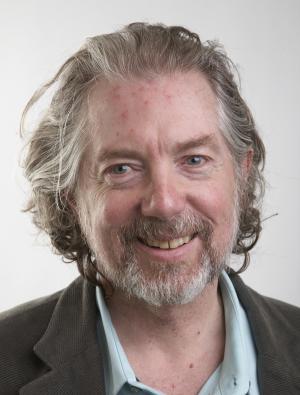 Jay Craven, professor of film and video studies, also started at Marlboro in 1998. He says of his time at the college, “I’ve most enjoyed my students, who have kept a lively conversation going for all of these years. Many of them have become second family for me.”
Jay Craven, professor of film and video studies, also started at Marlboro in 1998. He says of his time at the college, “I’ve most enjoyed my students, who have kept a lively conversation going for all of these years. Many of them have become second family for me.”
In addition to working with students in class and tutorials, Jay worked with them on nine film projects, including three feature movies produced through the Movies from Marlboro program. This unique-in-the-nation film intensive program brought a hundred students to campus, from more than 20 colleges, to collaborate in the production of ambitious films, from the Vermont portrait Northern Borders to the futuristic noir thriller Wetware.
“The Movies from Marlboro program provided the kind of transformational, experiential learning that education pioneer John Dewey urged with his call for intensive learning that enlarges meaning through ‘shared experience and joint action,’” says Jay. Students working with Jay also mentored high school kids during summer film intensives in the late 1990s and early 2000s.
“I apply the lessons I learned from Jay every day, both in the classroom and on the set,” says Brad Heck ’91, who is currently teaching film studies at Marlboro and producing documentaries with Willow O’Feral ’07, such as their recent Arming Sisters (Potash Hill, Spring 2015). As a student, Brad worked with Jay as a camera operator and cinematographer, and after graduating he worked extensively on the Movies from Marlboro program. “Jay has always held me to the highest standard as both a student and collaborator.”
“I think we raised the level of work in filmmaking and exposed students to opportunities to explore experimental, documentary, and narrative forms—and to learn more about film theory and the history of world cinema through film studies classes,” says Jay. “Many students who have wanted to go on and work in film have done so, in various capacities. Each carried something valuable away from their experience at Marlboro.”
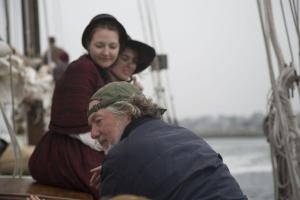 “Part of what makes Jay a great teacher is his ability to propel students into meaningful experiences,” says Amanda Wilder ’07, who directed the award-winning documentary Approaching the Elephant, produced by Jay. “If there was one thing Jay wanted you to do, it was find your personal vision. Uninterested in commercial Hollywood thinking, he sees film as art, a medium for self-expression, and was excited if you did too, immediately or eventually.”
“Part of what makes Jay a great teacher is his ability to propel students into meaningful experiences,” says Amanda Wilder ’07, who directed the award-winning documentary Approaching the Elephant, produced by Jay. “If there was one thing Jay wanted you to do, it was find your personal vision. Uninterested in commercial Hollywood thinking, he sees film as art, a medium for self-expression, and was excited if you did too, immediately or eventually.”
Jay enjoyed collaborating with faculty members over the years, from co-teaching a class with sociology professor Jerry Levy on 20th-century war films to working with Asian studies professor Seth Harter to produce an Asian Film Festival. Marlboro benefited greatly from a partnership with Jay’s nonprofit organization, Kingdom County Productions, to produce four seasons of campus and community performances.
“As a mentor, Jay always put me on an equal playing field,” says Mike Harrington ’03, director of the Wandering Reel Traveling Film Festival. “Jay inspires an appreciation of cinema that thinks outside of the mainstream box, and that’s the number one thing I look for when selecting films for my festival. He empowers his students to develop their own ideas, tell their own stories, and follow them through to the end.”
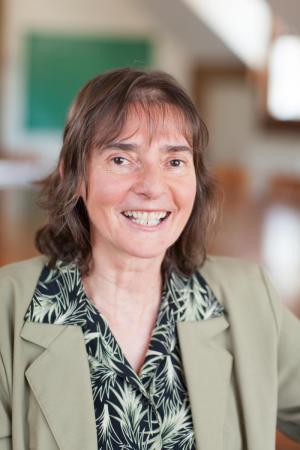 Politics professor Lynette Rummel joined Marlboro in 1993, following a three-year stint as a Fulbright-Hays lecturer in Tunisia. “The most rewarding part of teaching at Marlboro has been learning that education is a conversation,” says Lynette. “I started out thinking I had something to ‘teach’ my students. But small, non-required classes allowed my students to teach me—over and over and over again. I’ll miss being forced to be constantly learning.”
Politics professor Lynette Rummel joined Marlboro in 1993, following a three-year stint as a Fulbright-Hays lecturer in Tunisia. “The most rewarding part of teaching at Marlboro has been learning that education is a conversation,” says Lynette. “I started out thinking I had something to ‘teach’ my students. But small, non-required classes allowed my students to teach me—over and over and over again. I’ll miss being forced to be constantly learning.”
Lynette was an avid supporter of the World Studies Program (WSP), where she did a turn as director, and global learning in general. She collaborated on many Plans of WSP students and others with international components over the years, from global food institutions to changing economics and lifestyles in Vietnam.
“I’ve had so many interesting Plans,” says Lynette. “I’ve had a student who went to Albania, one who went to Senegal, another who went to Panama—all over the world. They become my eyes and my ears, another way for me to travel. And I love them all—I wouldn’t want anyone of them to think they are not my favorite.”
“Having Lynette as my Plan sponsor was a delight, an honor, and a great learning experience,” says Kelsa Summer ’13, assistant director for graduate and professional studies, who did her Plan on international development and social change. “Lynette taught me to always look for the bigger system, the more complex picture, and to take the most empathetic viewpoint. I especially enjoyed our tutorials at Lynette’s house, improved even more by the participation of Razzle the dog.”
Lynette greatly enjoyed research trips abroad, including a trip to the fledgling nation of Macedonia to conduct research on ethnicity, identity, and nationalism, and to Mali to explore trends presented in her African Politics class. But the highlights were collaborative learning on faculty-led trips with colleagues: to China with Seth Harter (Asian studies), John Willis (photography), Amer Latif (religion), and Felicity Ratté (art history); to Kenya with Jaime Tanner (biology); and to Nepal with Catherine O’Callaghan (assistant dean of academic advising and support).
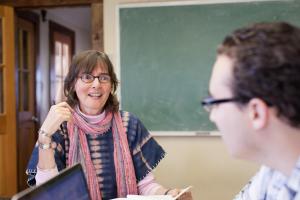 “Lynette was like a campus rockstar—drawing students in with her vibrant personality, sardonic wit, and perspicacity,” says Jonah Nonomaque ’17, who collaborated with her during the trip to Nepal on a research project about conversion to Protestantism. “Lynette encouraged ideological diversity and was respectful of all students’ points of view but had no problems picking apart fallacious arguments. She did this not to assert her own superior knowledge but to encourage us to become better critical thinkers and become comfortable with tackling hard questions.”
“Lynette was like a campus rockstar—drawing students in with her vibrant personality, sardonic wit, and perspicacity,” says Jonah Nonomaque ’17, who collaborated with her during the trip to Nepal on a research project about conversion to Protestantism. “Lynette encouraged ideological diversity and was respectful of all students’ points of view but had no problems picking apart fallacious arguments. She did this not to assert her own superior knowledge but to encourage us to become better critical thinkers and become comfortable with tackling hard questions.”
“When I think about my Marlboro experience, I mostly think of the people who made it such a formative one for me. Lynette is at the top of that list of amazing people,” says Sokol “Koli” Shtylla ’01, COO for Swanee Hunt Alternatives, a foundation advancing women’s inclusion in peace and security processes around the world. “She inspired me and others to always think of ourselves as citizens of the world, aware of history in order to learn from the past, but idealistic about the future and our ability to impact it.”
Also of Note
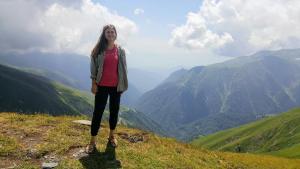 “I am interested in looking at how environmental policy changes when entities influence development and management of resources in a geopolitical or geographical setting that is different from their own,” says junior Leni Charbonneau. She spent last summer in the Republic of Georgia to carry out her Plan research, while contributing her efforts to development groups in the former Soviet nation. “I worked with a number of government-supported groups and agencies to learn about the state of environmental policy in the country and how this interacts with the boom of foreign interest and activity. Georgia is at a fascinating stage in which to study questions related to that frame of interest.”
“I am interested in looking at how environmental policy changes when entities influence development and management of resources in a geopolitical or geographical setting that is different from their own,” says junior Leni Charbonneau. She spent last summer in the Republic of Georgia to carry out her Plan research, while contributing her efforts to development groups in the former Soviet nation. “I worked with a number of government-supported groups and agencies to learn about the state of environmental policy in the country and how this interacts with the boom of foreign interest and activity. Georgia is at a fascinating stage in which to study questions related to that frame of interest.”
Reference and technology librarian Amber Hunt and technical services librarian Stephanie Sopka presented at the November meeting of the Vermont Library Association’s College and Special Libraries Program. They led a discussion titled “Weekly Team Meetings for Library Student Workers: A Not So Revolutionary Idea,” reflecting on their positive experiences working with student workers in the Rice-Aron Library. “We are fortunate to have such a responsive and responsible group of workers, and we all benefit from meeting together to review procedures, discuss new ideas, and just feel like we’re all in it together,” said Stephanie.
In October, senior Chris Lamb and philosophy professor William Edelglass presented at the International Association of Environmental Philosophy annual meeting in Memphis, Tennessee. Their paper “Rights, Culture, and Land: Theorizing Politics, Ecojustice, and Ceremony in Contemporary Native Environmental Activism” was based on collaborative research funded by an Aron Grant. “Among the 30 or so people in the audience was one of the contemporary scholars most influential in Chris’s thinking, Ed Casey, who agreed to read Chris’s paper and give him feedback,” said William. “It was a great experience for him and for me.”
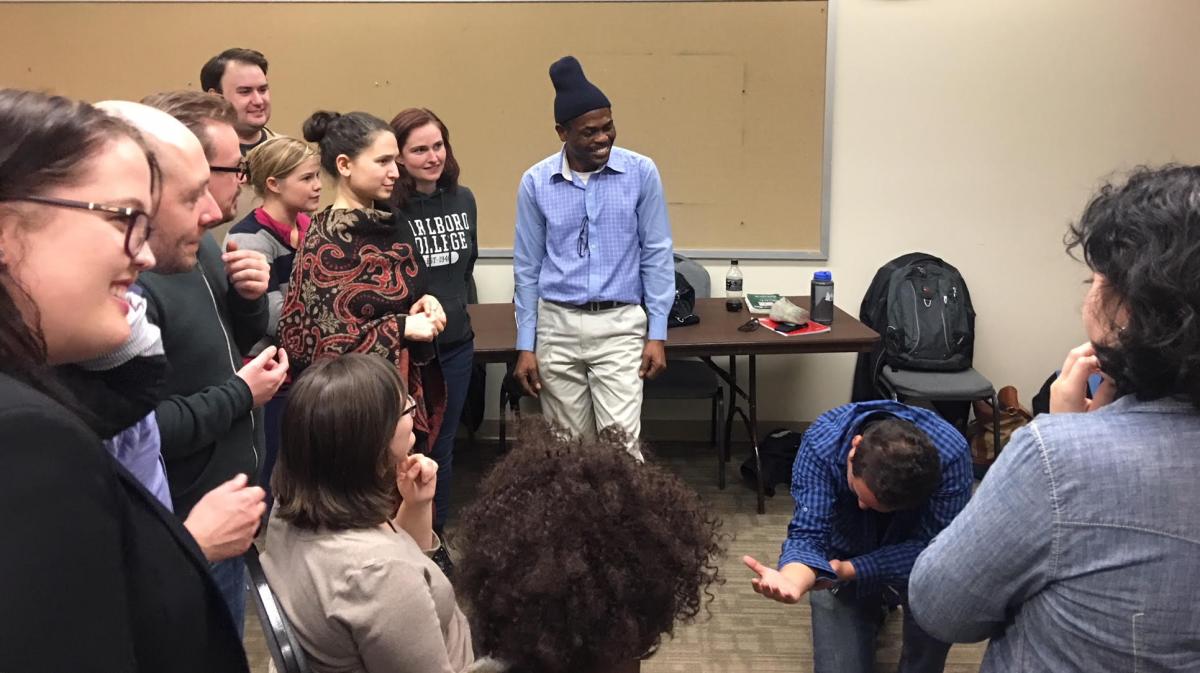 World Studies Program senior Amelia Fanelli (pictured, in Marlboro sweatshirt) was enrolled in a course called Conflict and Identity at the School for International Training (SIT) last fall, when she was joined for one class by students in the World Studies Colloquium. Together they made human sculptures in an attempt to illustrate conflicts in different countries. “The Marlboro and SIT students collaborated in creating these ‘sculptures,’ discussing the conflicts, and sharing ideas on possible resolutions,” says Jaime Tanner, biol-ogy professor and director of world studies. “It was a truly rewarding experience, and we hope to facilitate more meaningful exchanges between the institutions.”
World Studies Program senior Amelia Fanelli (pictured, in Marlboro sweatshirt) was enrolled in a course called Conflict and Identity at the School for International Training (SIT) last fall, when she was joined for one class by students in the World Studies Colloquium. Together they made human sculptures in an attempt to illustrate conflicts in different countries. “The Marlboro and SIT students collaborated in creating these ‘sculptures,’ discussing the conflicts, and sharing ideas on possible resolutions,” says Jaime Tanner, biol-ogy professor and director of world studies. “It was a truly rewarding experience, and we hope to facilitate more meaningful exchanges between the institutions.”
On behalf of Marlboro College, President Kevin signed a statement issued in September to the Vermont congressional delegation, decrying the decision to revoke the Deferred Action for Childhood Arrivals (DACA) program. Signed by all independent colleges in Vermont, the statement says the decision “threatens to disrupt the lives of students in our state and across the country who, through no fault of their own, have known no other home than the United States.” “Vermont has a long tradition of welcoming and embracing immigrants, and the state’s colleges are an important part of upholding that tradition,” said Kevin. See the full statement.
In November, dance students and faculty from colleges all around Vermont gathered at Marlboro College for the fourth annual Vermont College Dance Festival. During the two-day festival, dancers participated in performances and workshops including Senegalese dance, Brazilian dance, improvisation, contemplative dance, and Skinner releasing, as well as student-centered discussions. The emphasis was on encouraging artistic sharing, exchange of ideas, and a close community among higher education dance programs in Vermont. A highlight was the premier of Voice and Vessel, a performance by Delaney McDonough and Hanna Satterlee, funded in part by the New England Foundation for the Arts.
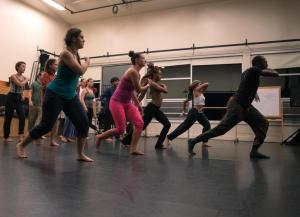 In September, Brooklyn-based dancer, choreographer, and current Marlboro student Ricarrdo Valentine led a free Afro-Cuban dance workshop to get community members’ inner dancers moving to the rhythm. Ricarrdo uses art as a vehicle for activism, and his education before studying dances at Marlboro includes Urban Bush Women’s Summer Leadership Institute, the Bates Dance Festival, and Earl Mosely’s Institute of the Arts. He has collaborated and worked with Christal Brown/INSPIRIT, Edisa Weeks/Delirious Dances, Paloma McGregor, Danté Brown/Warehouse Dance, and many others, and is the co-founder of Brother(hood) Dance!
In September, Brooklyn-based dancer, choreographer, and current Marlboro student Ricarrdo Valentine led a free Afro-Cuban dance workshop to get community members’ inner dancers moving to the rhythm. Ricarrdo uses art as a vehicle for activism, and his education before studying dances at Marlboro includes Urban Bush Women’s Summer Leadership Institute, the Bates Dance Festival, and Earl Mosely’s Institute of the Arts. He has collaborated and worked with Christal Brown/INSPIRIT, Edisa Weeks/Delirious Dances, Paloma McGregor, Danté Brown/Warehouse Dance, and many others, and is the co-founder of Brother(hood) Dance!
“I really appreciated some of the more sustainability- minded norms and practices in Germany,” says Kristen Thompson, who was the first Marlboro student to attend Leuphana University in Lüneburg, Germany, last fall, part of a new international exchange program. She was able to take some classes that were directly related to her Plan in environmental studies, particularly one on Restoration Ecology. “It was a seminar including a lot of fieldwork in a traditional orchard, and we had the opportunity to continue work that previous students had done,” says Kristen. “I also met a lot of lovely students from Germany and all over the world.”
Junior Clayton Clemetson spent most of the fall semester on tour with Northern Harmony, a Vermont-based world-music choir, while maintaining a full course load through long-distance tutorials. “On any given day we were either teaching one-to-three workshops for schools or local choirs, performing a concert, playing a ceilidh, or doing all three, not to mention driving to a new town each day. I could feel myself being shaped by this experience, pushing my limits in a way that nurtured personal and musical growth.” The two-month tour brought the group through England, France, Switzerland, Italy, and the U.S., culminating with a performance in Ragle Hall.
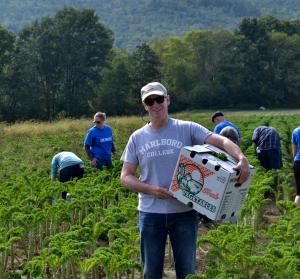 Outstanding in His Field
Outstanding in His Field
President Kevin joins students and other volunteers for the United Way Day of Caring in September, where they gained some “in-the-field” experience gleaning kale at Harlow Farm, Putney, to support the Vermont Foodbank. Photo by United Way of Windham County
Debating Power
Students Charlie Mahoney, Riley Wicks, Amelia Fanelli, and Annalise Guidry debate whether the Supreme Court has too much power, in a celebration of Constitution Day presented by Meg Mott’s Debating the Constitution class.
Digging Autumn
Senior Helen Pinch cultivates the community garden in October before planting a winter cover crop, one of the activities performed by faculty, staff, and students in honor of Marlboro’s founder on Hendricks Community Service Day.
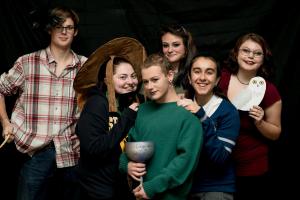 Hogwarts Dinner
Hogwarts Dinner
Students ham it up with the goblet of fire during the annual Hogwarts dinner, where community members and local families enjoyed quidditch, wand-making, and chocolate frogs for all.
Sunbursting with Pride
Sophomore Della Dolcino wins top prize in the King Arthur baking contest at the Marlboro Town Fair in September, wowing judges with her spectacular, braided chocolate yeast bread.
Events
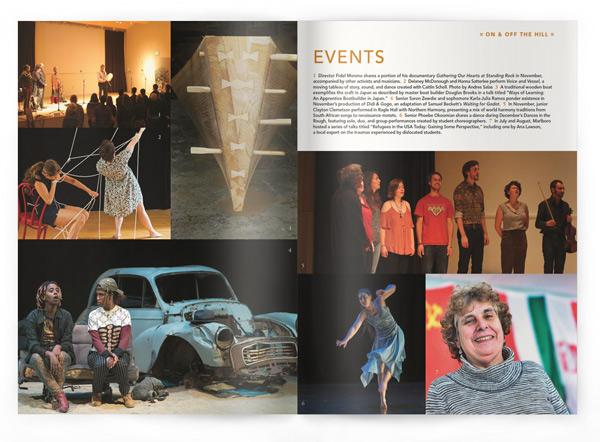
1 Director Fidel Moreno shares a portion of his documentary Gathering Our Hearts at Standing Rock in November, accompanied by other activists and musicians. 2 Delaney McDonough and Hanna Satterlee perform Voice and Vessel, a moving tableau of story, sound, and dance created with Caitlin Scholl. Photo by Andres Salas 3 A traditional wooden boat exemplifies the craft in Japan as described by master boat builder Douglas Brooks in a talk titled “Ways of Learning: An Apprentice Boatbuilder in Japan.” 4 Senior Saron Zewdie and sophomore Karla-Julia Ramos ponder existence in November’s production of Didi & Gogo, an adaptation of Samuel Beckett’s Waiting for Godot. 5 In November, junior Clayton Clemetson performed in Ragle Hall with Northern Harmony, presenting a mix of world harmony traditions from South African songs to renaissance motets. 6 Senior Phoebe Okoomian shares a dance during December’s Dances in the Rough, featuring solo, duo, and group performances created by student choreographers. 7 In July and August, Marlboro hosted a series of talks titled “Refugees in the USA Today: Gaining Some Perspective,” including one by Ana Lawson, a local expert on the traumas experienced by dislocated students.
Focus on Faculty
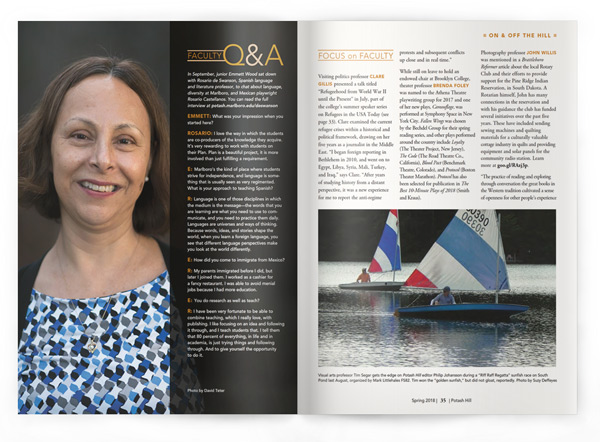
Faculty Q&A
In September, junior Emmett Wood sat down with Rosario de Swanson, Spanish language and literature professor, to chat about language, diversity at Marlboro, and Mexican playwright Rosario Castellanos. Read the full interview.
EMMETT: What was your impression when you started here?
ROSARIO: I love the way in which the students are co-producers of the knowledge they acquire. It’s very rewarding to work with students on their Plan. Plan is a beautiful project, it is more involved than just fulfilling a requirement.
E: Marlboro’s the kind of place where students strive for independence, and language is something that is usually seen as very regimented. What is your approach to teaching Spanish?
R: Language is one of those disciplines in which the medium is the message—the words that you are learning are what you need to use to communicate, and you need to practice them daily. Languages are universes and ways of thinking. Because words, ideas, and stories shape the world, when you learn a foreign language, you see that different language perspectives make you look at the world differently.
E: How did you come to immigrate from Mexico?
R: My parents immigrated before I did, but later I joined them. I worked as a cashier for a fancy restaurant. I was able to avoid menial jobs because I had more education.
E: You do research as well as teach?
R: I have been very fortunate to be able to combine teaching, which I really love, with publishing. I like focusing on an idea and following it through, and I teach students that. I tell them that 80 percent of everything, in life and in academia, is just trying things and following through. And to give yourself the opportunity to do it.
Focus on Faculty
 Visiting politics professor Clare Gillis presented a talk titled “Refugeehood from World War II until the Present” in July, part of the college’s summer speaker series on Refugees in the USA Today (see Events). Clare examined the current refugee crises within a historical and political framework, drawing on her five years as a journalist in the Middle East. “I began foreign reporting in Bethlehem in 2010, and went on to Egypt, Libya, Syria, Mali, Turkey, and Iraq,” says Clare. “After years of studying history from a distant perspective, it was a new experience for me to report the anti-regime protests and subsequent conflicts up close and in real time.”
Visiting politics professor Clare Gillis presented a talk titled “Refugeehood from World War II until the Present” in July, part of the college’s summer speaker series on Refugees in the USA Today (see Events). Clare examined the current refugee crises within a historical and political framework, drawing on her five years as a journalist in the Middle East. “I began foreign reporting in Bethlehem in 2010, and went on to Egypt, Libya, Syria, Mali, Turkey, and Iraq,” says Clare. “After years of studying history from a distant perspective, it was a new experience for me to report the anti-regime protests and subsequent conflicts up close and in real time.”
While still on leave to hold an endowed chair at Brooklyn College, theater professor Brenda Foley was named to the Athena Theatre playwriting group for 2017 and one of her new plays, Camouflage, was performed at Symphony Space in New York City. Fallen Wings was chosen by the Bechdel Group for their spring reading series, and other plays performed around the country include Loyalty (The Theater Project, New Jersey), The Code (The Road Theatre Co., California), Blood Pact (Benchmark Theatre, Colorado), and Protocol (Boston Theater Marathon). Protocol has also been selected for publication in The Best 10-Minute Plays of 2018 (Smith and Kraus).
Photography professor John Willis was mentioned in a Brattleboro Reformer article about the local Rotary Club and their efforts to provide support for the Pine Ridge Indian Reservation, in South Dakota. A Rotarian himself, John has many connections in the reservation and with his guidance the club has funded several initiatives over the past five years. These have included sending sewing machines and quilting materials for a culturally valuable cottage industry in quilts and providing equipment and solar panels for the community radio station. Learn more.
“The practice of reading and exploring through conversation the great books in the Western tradition cultivated a sense of openness for other people’s experience and other accounts of the world,” says philosophy and environmental studies professor William Edelglass. In August, William gave the commencement address for the Graduate Institute at St. John’s College, in Santa Fe, where he is an alumnus, and in the fall he gave a talk on “Reason and Faith in Indian Buddhism” at the University of Ottawa. He was also recently elected to chair of the board of directors for the International Association of Environmental Philosophy. William was instrumental in garnering a National Endowment for the Humanities grant for the Words Project in Brattleboro, Vermont. Learn more.
This fall, Asian studies and history professor Seth Harter presented a series of lectures on Japanese history and culture at the Brattleboro Chapter of the Osher Lifelong Learning Institute (OLLI). His weekly lectures focused on Japanese ways of seeing, writing, painting, building, cooking, and pursuing other activities, with emphasis on five disciplines.
“DeVos’ rewrite of the rules, published in late September, provides more flexibility in how institutions handle Title IX complaints,” writes politics professor Meg Mott, responding to the US Secretary of Education’s new Title IX rules in an October Times Higher Education article. Meg argues that the new guidelines encourage more attention to fairness and impartiality, and that colleges are given greater latitude to address the real problem of sexual assault on campuses. Teachers will no longer be compelled to report “anything that smacks of sexual impropriety,” and can encourage students in self-reflection as an alternative to mandatory reporting. Learn more.
“Like his character, Quebec Bill in Disappearances, Howard Frank Mosher was an indefatigable optimist and adventurer,” says film and video professor Jay Craven, referring to the prolific Vermont novelist and Jay’s longtime collaborator, who died in January 2017. “He wrote every day, in longhand on yellow legal pads, and lived his life, nonstop, with visions of character and story percolating in his imagination.” In December, Jay shared his reflections on three decades of collaboration at a special 25th-anniversary screening of his film Where the Rivers Flow North, both at Marlboro College and at Brattleboro’s Latchis Theatre.
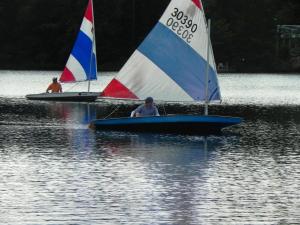 “Rosario Castellanos is a Mexican feminist playwright whose plays have not been studied,” says Spanish language and literature professor Rosario de Swanson, referring to the subject of her new book. “Her plays are very beautiful, and she’s one of the very first Mexican women who talked about homosexuality, in the ’50s and ’60s, when this was not talked about. In one of her plays she talks about not just male homosexuality but female.” You can find Rosario’s book, “¿Y cuál es mi lugar, señor, entre tus actos?”: el drama de Rosario Castellanos, published by Peter Lang Publishing Group.
“Rosario Castellanos is a Mexican feminist playwright whose plays have not been studied,” says Spanish language and literature professor Rosario de Swanson, referring to the subject of her new book. “Her plays are very beautiful, and she’s one of the very first Mexican women who talked about homosexuality, in the ’50s and ’60s, when this was not talked about. In one of her plays she talks about not just male homosexuality but female.” You can find Rosario’s book, “¿Y cuál es mi lugar, señor, entre tus actos?”: el drama de Rosario Castellanos, published by Peter Lang Publishing Group.
Religion professor Amer Latif was a panelist in a discussion titled “Democracy in the Deep Divide,” part of the October alumni weekend/open house/family day celebration. Politics professor Meg Mott moderated this discussion about whether or not Americans can still work together, and other panelists included alumni Katherine Gypson ’05 and Amber Schafer ’10.
“The way that scientists use the word ‘theory’ is a little different than how it is commonly used in the lay public,” says biology professor Jaime Tanner, as quoted in a July reference article called “What Is a Scientific Theory?” on the website livescience.com. “Most people use the word ‘theory’ to mean an idea or hunch that someone has, but in science the word ‘theory’ refers to the way that we interpret facts.” Jaime goes on to explain that a scientific theory is the framework for observations and facts—theories may change, or the way that they are interpreted may change, but the facts themselves don’t change.